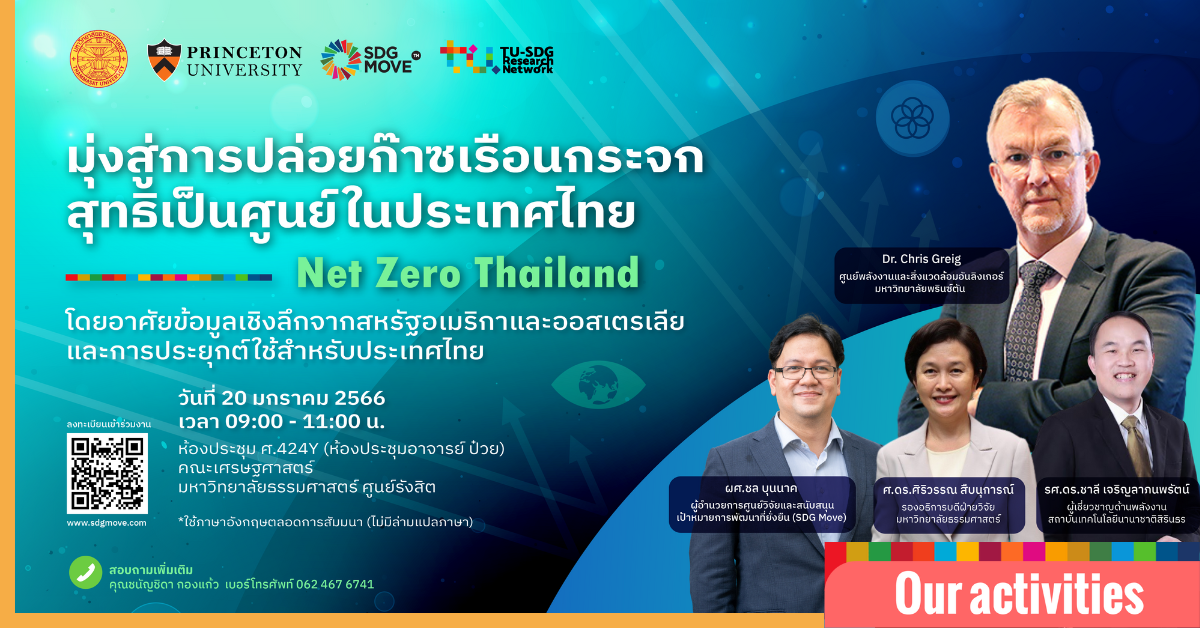You are cordially invited to the public seminar:
“Toward Net Zero Thailand with Insights from the US & Australia and Application for Thailand”
Friday, January 20, 2023 9:00 – 11:00 AM
Room 424Y (Puay Ungphakorn Conference Room)
Faculty of Economics, Thammasat University, Rangsit Campus
Limited seats available (80)

Thailand has pledged at COP26 to achieve net-zero greenhouse gas emissions. To achieve this goal, the Andlinger Center for Energy and the Environment (ACEE) of Princeton University is leading an international research initiative and is supporting similar efforts in Thailand, India, Brazil, Chile, and Israel.
The objectives of this seminar are to:
- Share insights from the United States and Australia to inform the analysis of pathways to achieve climate commitments
- Build interest and support among the community of Thammasat University and the National Science and Technology Development Agency (NSTDA)
- Affirm the collaboration between Thammasat University and the Andlinger Center for Energy and the Environment of Princeton University
Abstract: Net-zero pathways at the national scale – a new more robust approach
A ground-breaking study of decarbonisation pathways for the US – Net-Zero America: Potential Pathways, Infrastructure and Impacts – was released in 2021 by Princeton University.
Net Zero America (NZA) stands apart from previous studies in examining different pathways to net zero that include different proportions of renewables, different degrees of electrification, roles for nuclear and fossil fuels (with CCUS) that vary from minimal to large-scale, and the use of carbon land sinks and bioenergy with CCS (to provide negative emissions). It analyses the implications of decarbonisation (e.g. for land-use, project development, employment and financing) in unprecedented detail and granularity.
The study shows that net zero scenarios can be affordable – the annualized cost of energy services can remain comparable with today, but will encounter significant risks, including widespread land-use change, social licence challenges, workforce mobilization, and mobilizing development and construction capital.
Net Zero America was funded by major energy and industrial companies and included national environmental organisations on its oversight committee. It has received widespread coverage by US and international media and has been well received at all levels of government, industry, NGO’s. It was also highly influential in the formation of recent U.S. climate and energy infrastructure policies. Finally, Net-Zero America, is also inspiring similar studies, which Princeton co-leads with local universities around the world. In this presentation, Professor Chris Greig will present on the approach, methods, results and policy implications of Net-Zero studies in the United States and Australia, and will outline plans for similar efforts including in Thailand.
Presenter Biography

Chris Greig, is the Theodora D. and William H. Walton III Senior Research Scientist at Princeton University’s Andlinger Center for Energy and the Environment. He has a PhD in Chemical Engineering, is a fellow of the Australian Academy of Technology and Engineering (ATSE) and holds an adjunct professorial appointment at the University of Queensland in Australia.
His ten-year academic career follows almost three decades of international experience in the private sector, firstly as a company founder, and then in senior executive roles in major engineering, energy and resources companies. These included CEO of ZeroGen (one of the world’s early CCS ventures), Deputy Chair of Gladstone Ports Corp and Non-Executive Director of several listed engineering firms.
At Princeton, Chris spearheads the Rapid Switch Initiative at the Andlinger Center and is an Affiliated Faculty member of Princeton’s High Meadows Environmental Institute. His research combines, engineering, business and social sciences to explore the challenges of rapid decarbonization for different regions and sectors. He co-led Princeton’s influential Net-Zero America (2021) study which describes five net-zero emissions pathways for the United States at an unprecedented level of detail. Chris is also leading Princeton’s efforts on similar collaborative studies with universities around the world, including Australia and India.
Last Updated on February 23, 2024











